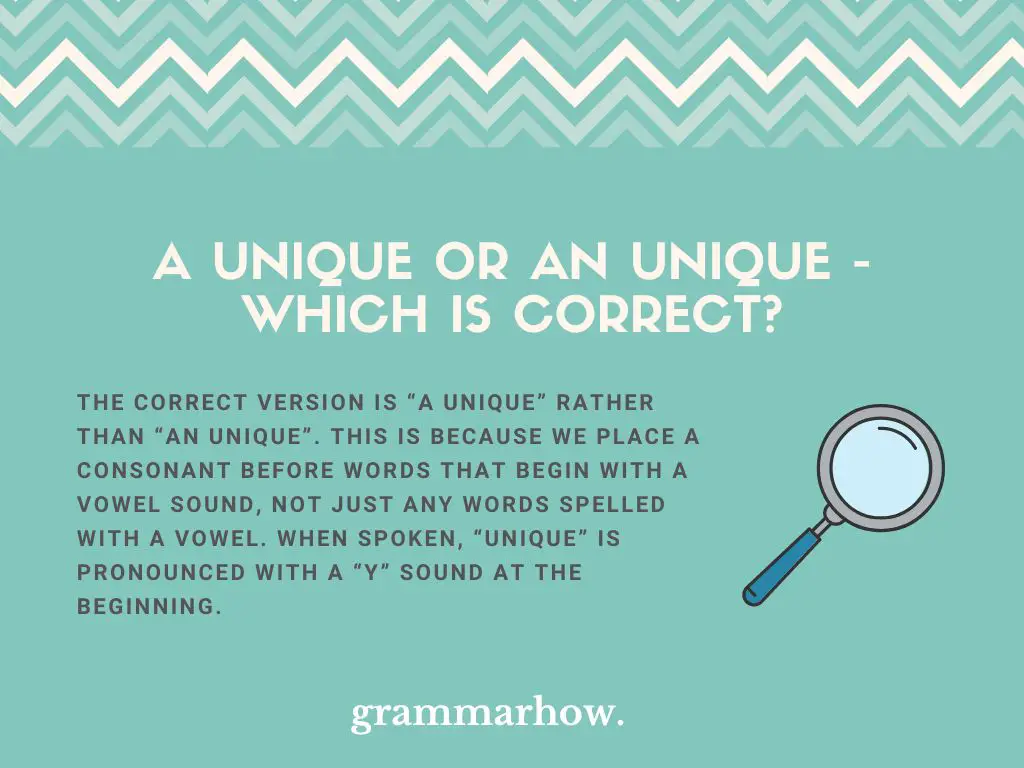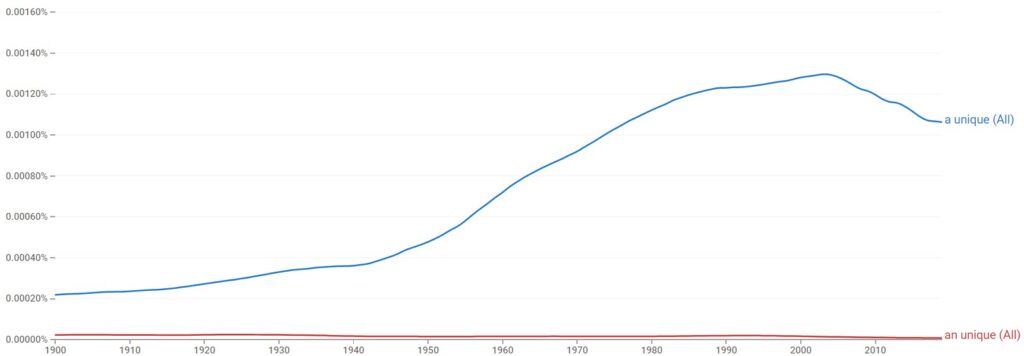You are absolutely special and unique. No one in the world is doing it like you. You make your own rules and carve out your own path in life. No one tells you what to do.
We’re going to tell you what determiner to use before “unique” now.
A Unique or An Unique – Which Is Correct?
The correct version is “a unique” rather than “an unique”. This is because we place a consonant before words that begin with a vowel sound, not just any words spelled with a vowel. When spoken, “unique” is pronounced with a “y” sound at the beginning.

This is why, even though “u” is a vowel, it’s okay to just use “a” before the word “unique”. When we say “unique”, we say it with a long “u”, so it sounds like there’s a “y” at the start: younique.
Try saying “a unique” and “an unique” out loud a few times to test it out.
If we check the Oxford Learner’s Dictionary, their definition for “a” confirms that it should be “used before consonant sounds and the form ‘an’ before vowel sounds”.
This rule applies to all words, so if you’re trying to figure out whether to use “an” or “a” before a word, just try saying it out loud to see if it starts with a vowel or consonant sound.
For example, the word “honor” starts with an “h” but the “h” is silent. When we say it out loud it begins with an “o” sound, so:
- Correct: It’s an honor to have been invited here today
- Correct: It’s a unique piece
- Incorrect: It’s a honor to have been invited here today
- Incorrect: It’s an unique piece
A Unique
If something is “unique” this literally means that it is one of a kind. However, this word is also more generally used to describe something as unusual or special.
Here are some examples of how you can use the phrase “a unique” in a sentence:
- She’s a unique person, evil, of course, but unique.
- The dress she’d picked out was a unique number, something sure to be noticed.
- From a young age, she had a unique interest in topics like safe cracking, money laundering, and heist-craft.
- It’s a unique piece; we should steal it.
- She’s searching for a unique experience in a world that feels increasingly mundane.
- When she grabbed her hand, a unique feeling overwhelmed her.
An Unique
It is incorrect to use “an” before “unique”. As “unique” is pronounced with a “y” sound at the beginning, we use “a” before it.
When something is “unique”, that means it is different and special in some way. The phrase “an unique” is different and special in some way, but sadly that way is that it is wrong.
Here are some examples of how you absolutely shouldn’t use “an unique” in a sentence:
- Incorrect: She’s an unique person; actually on second thoughts she’s quite boring.
- Incorrect: The dress she’d picked out was an unique number, something sure to be overlooked.
- Incorrect: From a young age, she had an unique interest in topics like playing with toys, putting things in her mouth that shouldn’t go in your mouth, and crying then falling asleep.
- Incorrect: It’s an unique piece; we should leave it where it is.
- Incorrect: She’s searching for an unique experience in a world that feels increasingly exciting.
- Incorrect: When she grabbed her hand, an unique feeling failed to occur.
Do People Often Use “An Unique”?
People shouldn’t use “an unique” but people do all sorts of things they shouldn’t do.
If we check the Google Ngram Viewer, we can see that “an unique” does get used very, very rarely.

The line tracking its usage has consistently stayed right near the bottom of the graph, so it seems like we’re mainly doing a good job on the grammar for this one.
It makes sense that a few “an uniques” are going to slip through the cracks occasionally!
Final Thoughts
Even though “unique” starts with a vowel when it’s pronounced it begins with a consonant sound: younique. As such, it is written as “a unique” rather than “an unique”. This is the rule for all words – it is based on how they sound, rather than the letter they start with.

Martin holds a Master’s degree in Finance and International Business. He has six years of experience in professional communication with clients, executives, and colleagues. Furthermore, he has teaching experience from Aarhus University. Martin has been featured as an expert in communication and teaching on Forbes and Shopify. Read more about Martin here.
